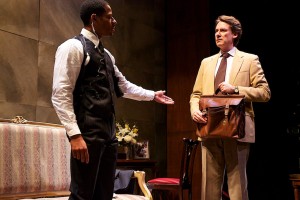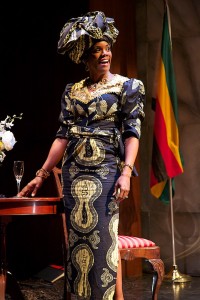Breakfast with Mugabe, a troubling, Macbeth-like play, which won the prestigious John Whiting Award in 2006, has finally arrived in New York (The Alice Griffin Jewel Box Theatre). The play, written by Fraser Grace and directed by David Shookhoff, centers around the malevolent spirit or ngozi which haunts Zimbabwean President Robert Mugabe.
A departed spirit may become an ngozi either through dying violently or not receiving the proper burial rites. The ngozi appears to Mugabe in the guise of one of his former freedom fighting comrades, General Josiah Tongogara. Tongogara was expected by many to become the first president of independent Zimbabwe. And as such, he was a threat to Mugabe’s own political ambitions, much in the same way that Banquo was a threat to Macbeth’s ruthless desire to be king. Tongogara’s death, which occurred just before the 1980 elections that brought Mugabe to power, was officially ruled an accident. Yet rumors have always swirled regarding Mugabe’s involvement in his former comrade’s untimely end.
Che Ayende, who plays Gabriel, the President's bodyguard, nearly steals the show. His good looks and deadpan humor instantly won over the audience. Ezra Barnes plays Dr. Andrew Peric, the white psychiatrist who is hired to cure the President of the ngozi. In addition to being a psychiatrist, he is also a farmer involved in a court battle to stay on his land, as embittered war veterans encroach on his property. Michael Rogers brings intensity, vulnerability and well-placed humor to his portrayal of Mugabe. And Rosalyn Coleman, who looks gorgeous in traditional African garb (thanks to costume designer Teresa Snider-Stein), is Mugabe’s younger wife — 40 years younger! She is desperate to see the President cured, so that he will finally let her go and allow her to start a new life.
A testament to this play’s power is that it will likely upset at least two different factions. Firstly, those who would like to see Mugabe portrayed two-dimensionally as a psychopathic dictator; and secondly, those who would like to see Mugabe championed (however few) as an unjustly treated African freedom fighter whom Western powers have conspired to destroy.
Over the last decade, highly touted documentaries including Mugabe and the White African directed by Lucy Bailey and Andrew Thompson, and memoirs such as The Fear: Robert Mugabe and the Martyrdom of Zimbabwe by Peter Godwin have documented the turmoil, strife and chaos which have engulfed Mugabe’s Zimbabwe. The narrative presented in such works has been rather simple: Mugabe is a racist dictator, hell bent on expelling all white farmers from Zimbabwe and redistributing their land amongst his cronies; and it is Mugabe’s land distribution policy and refusal to relinquish power which has plunged the country into a crisis.
Thankfully, Breakfast with Mugabe does not take us down this well-trodden path. A fact that speaks to Fraser Grace’s talent as the writer, but which may doom the play at the box office. The simple narrative of bad man Mugabe against heroic white farmers would have been a much easier sell. It would have demanded less of the audience: less imagination, thought or sophistication. But instead Grace has created an imaginative and complex piece of theater which plunges the audience into one man’s sick and guilty conscience.
I hope that Grace and the strong cast of Breakfast with Mugabe are rewarded for their efforts.



